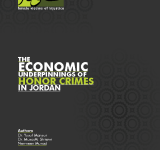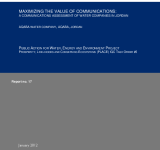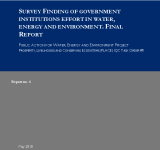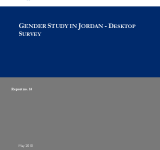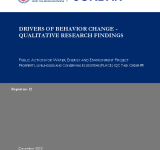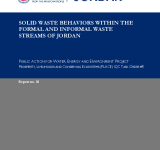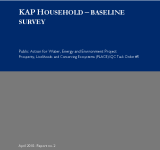behavior
يهدف هذا التقرير إلى دراسة العلاقة بين الاقتصاد وجرائم الشرف في الأردن. ويتحقق هذا التقرير من طبيعة هذه الجرائم المتعلقة بمؤشرات الفقر إلى جانب تصورات المجتمع لشرف العائلة;; ودور المرأة;; والأخلاق. النتائج المستخلصة من هذه الدراسة تكشف عن أن ما يسمى جرائم الشرف يرتبط بالفقر:: مما يدل على أن الفقراء هم الأكثر عرضة لارتكاب مثل هذه الجرائم. واعتمدت الدراسة على البحث الكمي والنوعي من أجل الحصول على البيانات والمعلومات المتعلقة بجرائم قتل النساء بإسم الشرف وانحصرت عينة الدراسة على مقابلة 27 من الجناة المتواجدين في مختلف المراكز في المملكة.
The report is based on the study designed to conduct a communications assessment of Aqaba Water Company;; one of the key water utilities in Jordan and to examine how its communications department collaborates with other areas of the organization. As part of the Public Action for Water;; Energy and Environment Project (PAP);; a public education and behavior change communication program developed to support USAID’s technical and policy investments in the Jordanian water and energy sectors;; the report finds that the effective communications can save the utility money by improving operations;; increasing efficiencies and reducing customer complaints. The report suggests that the strategic communications can be the key to a sustainable future for the kingdom during the times of critical resource constraints and presents some guiding principles and recommendations for the Aqaba Water Company’s communication efforts.
The report presents the findings of the government institutions efforts survey;; which is designed for the purpose of reviewing the government agencies’ current and past communication activities in water;; energy and environment. The specific objective of this survey is to review the Donor Position Paper on Outreach targeted sample of 36 staff from 22 government institutions from Aqaba and Karak. As part of the Public Action for Water;; Energy and Environment Project (PAP);; a public education and behavior change communication program developed to support USAID’s technical and policy investments in the Jordanian water and energy sectors;; this report finds that many government institutions have more than one role;; overseeing solid waste management;; industrial water and reuse and environmental laws. The report also finds that the communications programs are scattered and credibility and trust between service agencies and their clients is a concern. The interview analysis suggests that the Public Action Project needs to focus on two or three specific areas;; and the report recommends all capacity building activities to be focused on one goal of developing;; implementing and measuring national communication strategies and action plans.
The report presents the findings of a desktop survey conducted to review gender studies in Jordan with an overall goal of the survey as to ensure that gender is adequately addressed throughout project research;; analysis and activities of the Public Action for Water;; Energy and Environment Project (PAP). Under the PAP mandate to encourage water and energy conservation and to support behavior change towards more conservation and efficient practices both at the household level and in the commercial;; industrial and civil society arenas using social marketing behavioral methods;; the report is based on a gender desktop review of existing research on gender and natural resource management in Jordan. It capitalizes on the growing body of research on gender across sectors in Jordan including natural resource management;; to apply and adapt the findings to the PAP project activities. The report concludes with recommendations for the PAP projects such as donor collaboration;; improvement of women’s knowledge of water and energy saving methods;; engagement and creation of women’s participation to promote and support opportunities for small;; women-owned business promoting water and energy saving technologies and promotion of alternative technologies.
The report aims to understand the outlook of Jordanians;; the key determinants of behavioral change in search for “drivers” that can be used in programs promoting conservation of water or energy and reduction of solid waste. This research was conducted as part of the Public Action for Water;; Energy and Environment Project (PAP);; which aims to encourage water and energy conservation and to support behavior change towards more conservation and efficient practices both at the household level and in the commercial;; industrial and civil society arenas using social marketing behavioral methods. It is based on the qualitative research that focuses on identifying people’s motivations;; needs and desires to help formulating social marketing programs and developing adaptive capacity in individuals and groups. Some of the key questions of the qualitative research include “What are the current coping behaviors and attitudes (psychological;; social;; etc …) of the Jordanian public (disaggregated by gender;; age;; geography and income) in the face of limited water availability and high prices for energy?;; What anticipated consequences may the Government face if stricter scenarios were imposed on water and energy? The report recommends the Ministry of Education to cooperate and introduce regular classes that focus on showing youth the direct impact of water;; energy and environment on their lives and raise awareness and consciousness of children regarding their role in the environment and influence it in a positive way.
The report studies the formal and informal waste streams in Jordan as well as the public behaviors and attitudes that influence them. The study gives a specific emphasis to discovering the “drivers” of these practices as well as barriers to change and aims to locate examples of model behavior that already exists in Jordan so that they can be encouraged and duplicated. It investigates and assesses the four areas – the general attitudes of the Jordanian population towards waste and waste disposal;; informal waste reclamation sector in Jordan;; stream of recyclable material and the formal sanitation and waste management system of Amman and Aqaba. This research was conducted as part of the Public Action for Water;; Energy and Environment Project (PAP);; which aims to encourage water and energy conservation and to support behavior change towards more conservation and efficient practices both at the household level and in the commercial;; industrial and civil society arenas using social marketing behavioral methods. The study finds that there were high levels of awareness and concern about issues such as littering and recycling but it also concludes that the lack of concern amongst the broader public was cited as one principal reasons that people were not taking action. It calls for a quantitative research to confirm Jordanian attitudes on environmental issues.
The report is based on the KAP household baseline survey;; which measures the current awareness of methods of water and energy conservations to determine how the Jordanians currently dispose of their household waste and how serious they believe the threat of global warming to be in Jordan. The household baseline survey on the use of water;; energy;; and the management of solid household waste has been designed based on the Knowledge;; Attitude and Practice (KAP) model;; and it aims to serve as a prelude to education and changing public behavior in the water and energy sectors in Jordan;; and to supply specific initiatives in the environment;; in particular in regard to the management of solid household waste. The research is based on a qualitative research;; a questionnaire and semi-structured interviews. The report concludes with the main findings that the most trusted sources of information on water conservation were the Ministry of Water and Irrigation;; and the Jordan Water Company. The survey finds that the respondents believe that the water shortage can be overcome with the water authorities' leadership including their engagement in grand projects.
